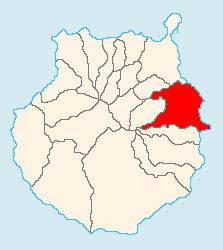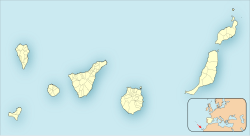Telde
| Telde | |||
|---|---|---|---|
| Municipality and town | |||
|
|||
 Location of the municipality in Gran Canaria |
|||
| Location in the Canary Islands | |||
| Coordinates: 27°59′N 15°25′W / 27.983°N 15.417°W | |||
| Country | Spain | ||
| Autonomous Region | Canary Islands | ||
| Province | Las Palmas | ||
| Island | Gran Canaria | ||
| Government | |||
| • Mayor | Carmen Rosa Hernández Jorge | ||
| Area | |||
| • Total | 102.43 km2 (39.55 sq mi) | ||
| Elevation | 130 m (430 ft) | ||
| Population (2013) | |||
| • Total | 102,170 | ||
| • Density | 1,000/km2 (2,600/sq mi) | ||
| Demonym(s) | Teldenses | ||
| Time zone | CET (UTC+1) | ||
| • Summer (DST) | CEST (UTC+2) | ||
| Postal code | 35200 | ||
| Official language(s) | Spanish | ||
Telde is a town and a municipality in the eastern part of the island of Gran Canaria, Canary Islands, overseas (Atlantic) insular Spain.
It is the second most populous municipality on the island, with a population of 102,170 (2013). Its area is 102.43 km2 (39.55 sq mi). The city is the oldest and the first capital of the island of Gran Canaria, founded before 1351, a former medieval bishopric and present Catholic titular see.
The city Telde is located 4 km from the coast and 16 km south of the island capital Las Palmas. The GC-1 motorway passes east of the city. The Gran Canaria International Airport is located in the subdivision of Gando, south of Telde.
Before the Spanish invasion Telde was the eastern centre to the aborigines of the island, and the renowned aborigen Doramas is believed to have lived here. Early records point to about 14,000 aborigen dwellings here in Telde at the time of conquest, and Telde is the spot where the famous Idolo de Tara figure—currently housed in the Museo Canario in Las Palmas—was discovered.
It was created by papal decree is 1351. Today Telde is Gran Canaria's second city with a population over 100,000. The historic old town area of Telde is particularly popular with visitors.
On 1351.11.07 was established the Diocese of Islas de la Fortuna (español) / Isola de Fortunate (Italiano) / Insulas Fortunatis (Latin), meaning 'Fortunate islands', nickname of the Canaries, territory split off from the Balearic Diocese of Mallorca, as suffragan of the (Andalusian) Metropolitan Archdiocese of Seville.
Renamed in 1369 after its see as Diocese of Telde (Spanish) / Telden(sis) (Latin adjective).
On 1404.07.07 it lost territory to establish the Diocese of Rubicon.
In 1441 it was suppressed, without direct successor.
(all Roman Rite and members of Latin congregations)
...
Wikipedia



